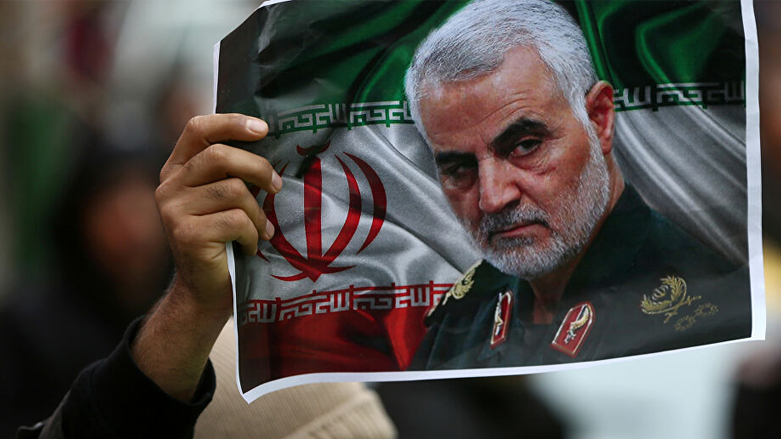Anyone involved in Soleimani killing will be held responsible, Iran says

ERBIL (Kurdistan 24) – Any entity linked to the assassination of top Iranian commander Qasim Soleimani, whether “directly or indirectly,” will be held responsible, Tehran said Monday.
The remarks came in a press briefing by Iran’s foreign ministry spokesperson, Saeed Khatibzadeh, after an investigative report published by Yahoo News alleged the involvement of the PUK Counter Terrorism Group (CTG) in the Jan. 3, 2020 assassination of the head of Iran’s Revolutionary Guard Corps Quds Force, Qassim Soleimani, along with his Iraqi comrade Abu Mahdi al-Muhandis, deputy leader of the Hashd al-Shaabi (Popular Mobilization Forces), the umbrella of Iran-backed militias in Iraq.
“The case of Martyr Soleimani is being pursued in the judiciary and international forums,” Khatibzadeh said, adding that “many of these reports are not hidden from us.”
“All those who directly or indirectly participated in this cowardly assassination definitely have criminal and legal responsibility,” he added.
The Yahoo News story published on Saturday includes insider details about the US operation to kill both men in a drone strike outside Baghdad airport, described by former acting US Secretary of Defense Chris Miller as “the most sophisticated prep the department has done” in counterterrorism operations. One of the report’s authors, Jack Murphy, later tweeted a thread outlining the “crucial role” of the PUK's elite CTG in the operation.
The Kurdistan Region Directorate General of Counter Terrorism (CTD) on Sunday rejected any affiliation with the Sulaimani-based counterterrorism unit named in the investigative report, which it said is “affiliated with Lahur Sheikh Jangi and his brothers.” Sheikh Jangi is the sitting co-president of the PUK.
Murphy and co-author Zach Dorfman explained that one of the CTG’s contributions to the mission was helping American special forces identify the two targets, Soleimani and Muhandis, after they stepped outside the plane that had carried them from Damascus to Baghdad.
“As the plane taxied off the runway, toward the closed-off portion of the airfield, one of the Kurdish operatives [from the PUK CTG] disguised as ground crew guided the aircraft to a halt on the tarmac,” according to the report.
“When the target stepped off the airplane, Kurdish CTG operators posing as baggage handlers were also present to positively identify” the Iranian commander, the story said.
Further emphasizing the CTG’s role in the operation, the story said a CTG operative in disguise as an Iraqi police officer photographed the aftermath of the drone strike, “and quickly obtained a tissue sample for DNA confirmation” that the targets were dead.
In retaliation for the assassination of its leading general, Iran on Jan. 8, 2020 launched a volley of ballistic missiles airbases at Iraqi and Kurdistan Region bases that house US and foreign forces, in an operation codenamed Martyr Soleimani. No one was killed in the attack, but the US Department of Defense later said more than 100 service members were treated for traumatic brain injuries. Expecting a US response, Iran later mistakenly shot down a Ukranian passenger jet departing Tehran, killing 176 people.
